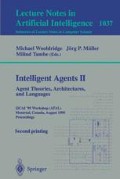Abstract
Drawing on on our work in the area of Distributed Artificial Intelligence, we propose the rudiments of an approach to reasoning about other agents. We attempt to relate current philosophical intuitions to theoretical foundations, and concentrate on the issue of modeling. The philosophical position we have put forth is a combination of Daniel Dennett's philosophy of the ladder of agenthood (consisting of rationality, intentionality, stance, reciprocity, communication, and consciousness) on one hand, and the utilitarian philosophy of selfish utility maximization on the other hand. Dennett's notion of a stance is fundamental to the issue of modeling other agents, and in interesting special cases ti leads to nesting of models. Our own framework, the Recursive Modeling Method (RMM), represents this nesting and lets an agent coordinate its actions with the actions of other agents, cooperate with them when appropriate, and rationally choose an optimal form of communication with them.
Preview
Unable to display preview. Download preview PDF.
References
Robert J. Aumann and Adam Brandenburger. Epistemic conditions for Nash equilibrium. Working paper, Harvard Business School, Harverd, 1994.
Robert J. Aumann and Adam Brandenburger. Epistemic conditions for Nash equilibrium. Accepted for Publication in Econometrica, 1995.
Afzal Ballim and Yoric Wilks. Artificial Believers. Earlbaum Associates, Inc., 1991.
G. J. C. Bertrand. Pleasure and Desire: The Case for Hedonism Reviewed. Clarendon Press, 1969.
Cristina Bicchieri, Eithan Ephrati, and Aldo Antonelli. Games servers play: A procedural approach. In this Collection.
Ken Binmore. Essays on Foundations of Game Theory. Pitman, 1982.
Peter Cheeseman. In defense of probability. In Proceedings of the Ninth International Joint Conference on Artificial Intelligence, pages 1002–1009, Los Angeles, California, August 1985.
D. Dennett. Consciousness Explained. Little, Brown & Co., 1991.
Jon Doyle. Rationality and its role in reasoning. Computational Intelligence, 8:376–409, 1992.
Edmund H. Durfee, Jaeho Lee, and Piotr Gmytrasiewicz. Overeager rationality and mixed strategy equilibria. In Proceedings of the National Conference on Artificial Intelligence, July 1993.
Ronald R. Fagin, Joseph Y. Halpern, and Moshe Y. Vardi. A model-theoretic analysis of knowledge. Journal of the ACM, (2):382–428, April 1991.
Piotr J. Gmytrasiewicz and Edmund H. Durfee. Logic of knowledge and belief for recursive modeling: Preliminary report. In Proceedings of the National Conference on Artificial Intelligence, pages 628–634, July 1992.
Piotr J. Gmytrasiewicz and Edmund H. Durfee. Toward a theory of honesty and trust among communicating autonomous agents. Group Decision and Negotiation, 2:237–258, 1993.
Piotr J. Gmytrasiewicz and Edmund H. Durfee. Formalization of recursive modeling. In In Proceedings of the First International Conference on Multiagent Systems, ICMAS'95, July 1995.
Piotr J. Gmytrasiewicz and Edmund H. Durfee. Rational interaction in multiagent environments. Submitted for publication, 1995.
Piotr J. Gmytrasiewicz, Edmund H. Durfee, and David K. Wehe. A decisiontheoretic approach to coordinating multiagent interactions. In Proceedings of the Twelfth International Joint Conference on Artificial Intelligence, pages 62–68, August 1991.
Piotr J. Gmytrasiewicz, Edmund H. Durfee, and David K. Wehe. The utility of communication in coordinating intelligent agents. In Proceedings of the National Conference on Artificial Intelligence, pages 166–172, July 1991.
Joseph Y. Halpern. Reasoning about only knowing with many agents. In Proceedings of the National Conference on Artificial Intelligence, pages 655–661, July 1993.
Joseph Y. Halpern and Yoram Moses. Knowledge and common knowledge in a distributed environment. In Third ACM Conference on Principles of Distributed Computing, 1984.
Joseph Y. Halpern and Yoram Moses. A guide to the modal logics of knowledge and belief. Technical Report 74007, IBM Corporation, Almaden Research Center, 1990.
Joseph Y. Halpern and Yoram Moses. Reasoning about knowledge: a survey circa 1991. Technical Report 50521, IBM Corporation, Almaden Research Center, 1991.
J. Harsanyi. Bayesian decision theory and utilitarian ethics. American Economic Review, (68):223–228, 1978.
Joseph B. Kadane and Patrick D. Larkey. Subjective probability and the theory of games. Management Science, 28(2):113–120, February 1982.
Roger B. Myerson. Game Theory: Analysis of Conflict. Harvard University Press, 1991.
Ajit Narayanan. On Being a Machine. Ellis Horwood, 1988.
Richard E. Neapolitan. Probabilistic Reasoning in Expert Systems. John Wiley and Sons, 1990.
Judea Pearl. Probabilistic Reasoning in Intelligent Systems: Networks of Plausible Inference. Morgan Kaufman, 1988.
J. L. Pollock. How to Build a Person: A Prolegomenon. MIT Press, 1989.
Ayn Rand. On the Virtue of Selfishness, a new Concept of Egoism. New American Library, 1964.
Jeffrey S. Rosenschein and Gilag Zlotkin. Rules of Encounter. MIT Press, 1994.
Yoav Shoham. Agent-oriented programming. Technical Report STAN-CS-90-1335, Computer Science Department, Stanford University, Stanford, California 94305, 1990.
Yoav Shoham and Moshe Tennenholtz. On the synthesis of useful social laws for artificial agents societies (preliminary report). In Proceedings of the National Conference on Artificial Intelligence, July 1992.
Eric Werner. Toward a theory of communication and cooperation for multiagent planning. In Proceedings of the 2nd Conference on Theoretical Aspects of Reasoning about Knowladge, pages 129–142. Morgan Kaufman, 1988.
Author information
Authors and Affiliations
Editor information
Rights and permissions
Copyright information
© 1996 Springer-Verlag Berlin Heidelberg
About this paper
Cite this paper
Gmytrasiewicz, P.J. (1996). On reasoning about other agents. In: Wooldridge, M., Müller, J.P., Tambe, M. (eds) Intelligent Agents II Agent Theories, Architectures, and Languages. ATAL 1995. Lecture Notes in Computer Science, vol 1037. Springer, Berlin, Heidelberg. https://doi.org/10.1007/3540608052_64
Download citation
DOI: https://doi.org/10.1007/3540608052_64
Published:
Publisher Name: Springer, Berlin, Heidelberg
Print ISBN: 978-3-540-60805-9
Online ISBN: 978-3-540-49594-9
eBook Packages: Springer Book Archive

